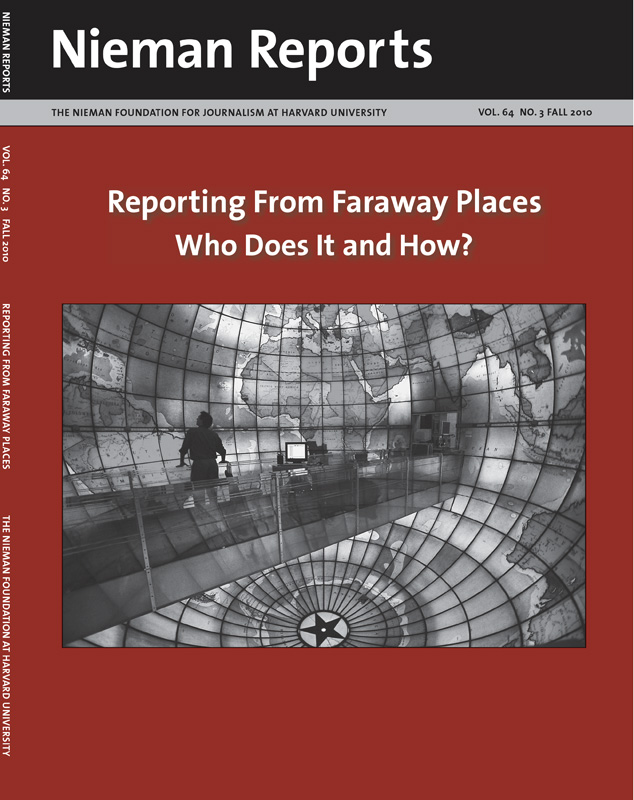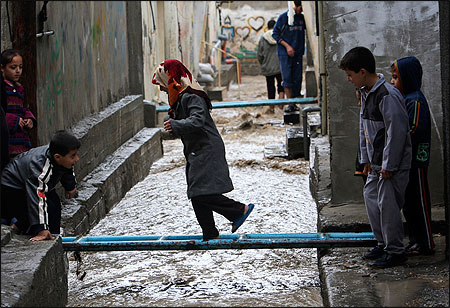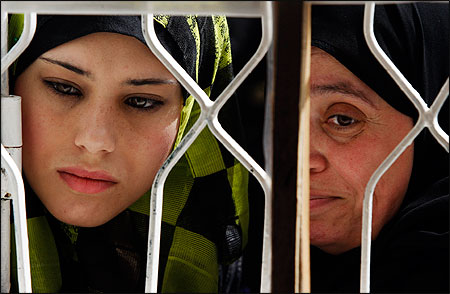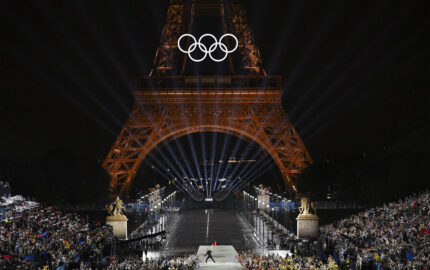
Reporting From Faraway Places: Who Does It and How?
Foreign bureaus staffed by correspondents from a newspaper or broadcast network are now largely relics of a bygone era. As this 20th century model of reporting fades, fresh approaches to international reporting are evolving. Nonprofits and freelancers fill much of the void left by news organizations, as do locally based correspondents, an array of partnerships, and digital experimentation. Writing out of their experiences with these new approaches, reporters and editors portray a time of dizzying change, economic challenges, and abundant storytelling possibilities.

Palestinian children walk on a makeshift bridge over floodwaters after a rainstorm in a Gaza City refugee camp. Photo by Adel Hana/The Associated Press.
From 2001 to 2009, Taghreed El-Khodary, who is Palestinian, reported from Gaza for The New York Times. Her reporting for the Times ceased soon after it was revealed that the son of Ethan Bronner, the paper’s Jerusalem bureau chief, was serving in the Israeli army. The Times decided not to remove Bronner from that position.
In June, El-Khodary spoke at The Palestine Center in Washington, D.C. as a panel member at a discussion about covering Palestine. At that event, she spoke briefly about her decision to suspend her reporting, expressing how sorry she was to leave Gaza.
“But my bureau chief’s son joined the Israeli army and I felt like it’s not wise of me [to stay],” she said, and explained why. “I don’t want to risk losing my sources that I have been establishing for many, many years. It’s a very sensitive issue, as you all know, not only that, but it’s also risky and you have many small groups who would like revenge and I can be a great person to get a hold of. It’s very sensitive and I was really disappointed that they took this decision but they understand why I left.”
Read the full transcript of that discussion »

Palestinians living in a refugee camp in Gaza City wait for their monthly food supply from the United Nations. Photo by Lefteris Pitarakis/The Associated Press.
El-Khodary, who is a 2006 Nieman Fellow, is a visiting scholar in the Middle East program at the Carnegie Endowment in Washington, D.C., where she focuses her research on Gaza. She spoke with Nieman Reports editor Melissa Ludtke in June shortly after Israel raided one of the ships in the flotilla of boats headed from Turkey to deliver supplies to the people of Gaza. In the conversation, she spoke about how she approached her coverage of Gaza. Edited excerpts appear below:
Taghreed El-Khodary: When I worked on a story in Gaza, I understood that I was writing for Americans. I felt as though I play a role in explaining the situation happening on the ground. I feel responsible for doing that.
Melissa Ludtke: Right now, as news of the Israeli raid on the flotilla is breaking, you are not in Gaza and the Times doesn’t have another person with your kind of experience to bring news to their readers. Without you there, what dimensions of this story are we not getting?
El-Khodary: We can always learn something. I feel guilty, as a journalist, to leave the place, but at the same time for me, it’s important to get out, to breathe, and to listen to other voices. For me, I cannot live in one place. In Gaza, there has been so much pressure on me that I decided to take off for a while.
Ludtke: How would you describe your mission as a journalist in covering Gaza for a Western audience?
El-Khodary: I felt the pressure of being the only one covering the war in Gaza for The New York Times. Whenever there is a war somewhere the newspaper will send an army of journalists, an army of producers. But in Gaza I’m by myself covering that big story. I felt so responsible. Many wire service journalists decided to work from home or only from their office; they relied heavily on their photographers and their cameraman. But as a journalist, I felt responsible to go to the scene to actually see it. I cannot believe it unless I see it. I cannot believe anything unless I see it with my eyes.
Ludtke: That’s a very big risk.
El-Khodary: Yes. It is a risk. I risked my life several times. I have a very good driver, but he has a family so I can’t ask him to take those risks. I always asked him to stay away, and I would walk. On many occasions I would walk by myself. It was hard but there was a driving force inside me to get the truth out because I am responsible and it was very critical to tell this story. I don’t want to give any wrong information so I am very thankful that there was nothing wrong in my articles. Even when there was [a disputed] bombing of a school, I didn’t say that it happened inside the school. I said outside.
I knew because I went to the scene, I went to the hospital, I spoke to witnesses. Many other news organizations had to correct their reporting after they found out that it wasn’t inside the school. It was outside. Many civilians were hurt, of course, but I said the bombing happened outside of the school. There were Jewish readers and Israelis who asked the newspaper to correct my story. But the Times said that they didn’t need to correct what I’d written. It was reported correctly.
Ludtke: But people thought you’d said it happened inside of the school?
El-Khodary: I felt like I did my part when I covered that story. All I was thinking was to get the truth out to the American people. That was my only agenda, to get the truth out.
Ludtke: You talk about Western audiences responding to what you write. With digital media, your sources in Gaza can read The New York Times. I’m wondering if they perceived a bias in the coverage of the Israeli and Palestinian conflict in the paper’s overall coverage and, if so, whether that perception would pose problems for you in going back to them as sources.
El-Khodary: Luckily, I enjoy a good reputation because I never belonged to any political faction; even my parents have nothing to do with politics. It is an advantage. When I see what I believe is the truth, I speak out. And I have people around me in the community who are aware of me as a journalist and know that I am fair.
Ludtke: So they are able to separate you, as the journalist they know, from the institution for which you write that they may perceive as having a different view?
El-Khodary: I mean, you have the Jewish Americans, some of them, that are not happy at all with the coverage. Then you have some Palestinians and they are not happy with the coverage. But, you know? You cannot make everybody happy. And yes, I feel very sad that Gaza has not been covered in the past year. No features or analysis of the place until recently.
Ludtke: How did you reconcile your own commitment, for lack of a better word, to the cause of the Palestinian people with the expectation of how you would go about covering what happened there in an objective way? Did you have a difficulty in reconciling these two things?
El-Khodary: Human beings fascinate me; it’s people who move me. It’s a hard story, but I just get a feel for the people anywhere I go. It doesn’t have to be a place where I’m from. But at the same time, of course, I was born and raised in Gaza. And I can see since childhood how the place has changed. It’s a sad story, definitely. I mean, it’s sad when I see how the society is collapsing. It is due to the wrong policies. It’s sad to see it going, in a way, backwards. And I see all of that, and I am moved, of course. But you have to learn, and I always say that I am not the story. I am out of it. I observe the place, and I describe it as it is. If I talk to people, I talk to all sides of the story. That’s how I conceive it.
When I was in the West Bank, I asked people living there questions because I want to understand the mindset. How do they think? Why for them is it important to take over a Palestinian land in the West Bank? They are leaving Brooklyn or Manhattan to go live in a Palestinian village or Palestinian town saying that it is part of “our DNA.” For me, it is fascinating to understand so I interview many of them. For me, it is always interesting to understand the other voice, the other analysis, so I can get the whole picture.
I don’t isolate myself from their reality. I am a realist. I cannot just be stuck with only one side of the story. That’s one of the reasons it’s so hard to be in a place like Gaza and just to cover the same thing over and over again.
Ludtke: What are challenges you see with Western news organizations parachuting someone in to report from Gaza? Will they have the ability to tell anything approximating an accurate story about what’s happening there and the forces at play?
El-Khodary: It’s important to have an outside eye coming in and observing the place and describing the place. But of course, they cannot do it by themselves because most of them don’t speak the local language. So, of course, they need someone always to help them, whether it’s a driver, whether it’s a local reporter, to help them, to guide them. It is very important to find a good one because in the end that person is guiding them.
Ludtke: And framing the story in many ways?
El-Khodary: Yes, of course. They play a great role in framing the story, and that’s why it’s important to find a credible one, a good one. The scary thing is when some reporters go to the field and find it hard to listen to people. There are those who are completely brainwashed and stick with whatever stereotype they bring with them.
Ludtke: How can you tell who is going to be a good guide and who is not?
El-Khodary: You just have to keep trying. It’s a relationship you develop, and you will see how you can be comfortable and how you understand each other, and then you figure out how the other person works.
Ludtke: I would guess that Western audiences bring perceptions about Gaza and the people who live there to their reading of stories about Gaza or about this conflict. Did you make an effort in your stories to break through some of these preconceptions?
El-Khodary: There are many preconceptions that people have from their reading. They want it to be a certain way. But as reporter, you cannot; you have to see the whole thing as it is. This takes time—to understand the whole dynamic—so it’s essential to spend time in the place. It’s essential to talk to many people. That is very important. There are things that people don’t say but in time you can read it through their voice, facial expression, and action. It’s what I call the living expressions, the feeling, and those are very important to understand.
Ludtke: Can you remember a story in which you think your reporting conveyed this living expression of feeling?
El-Khodary: I have a list of many of them. There is so much pain in Gaza. There are many people who lost their loved ones, and these are the moments. When a woman is talking about her love of her girl or the loss of her boy. This is very important. There are many women who will lose children and the pain is expressed differently from one human being to another. You need to be able to transmit, to understand and to conceive it. There are those that don’t cry and are not expressive. To feel it, it means you have to get closer to the source. You have to think like them. You have to make them feel very comfortable with you.
Ludtke: A lot of the time you’re probably dealing with people who have suffered from trauma, and that requires a particular need for empathy, understanding and special journalistic skills.
El-Khodary: These are very sensitive and delicate stories. You have to pay attention and you have to respect the pain. You have to be able to listen. It is very crucial and difficult since you are not the one going through that pain. There are many people who cover this story, but how many people feel it? How many people can?
Ludtke: I’m wondering if there were challenges for you in terms of being a woman and doing this reporting in the region in which you were working. I can’t imagine that there are a lot of Palestinian women working there as reporters.
El-Khodary: Surprisingly it is changing from when I started reporting in the mid-1990’s. Many female reporters are working there. But how many women go into the field? Some rely heavily on their cameramen. Some go. It depends on the story. I can go anytime at night. Many women cannot.
Ludtke: Why are you able to and other women can’t?
El-Khodary: Because I don’t have a family that would say no.
Ludtke: This has more to do with cultural norms rather than laws or regulations.
El-Khodary: Yes. And sometimes it’s very helpful to be a woman. Especially covering stories about women. At the same time, of course, as a woman, there is much pressure. But you have to manage. You have to be able to present yourself in a very respectable way. You have to respect the place, after all. Wherever you go, first of all you have to understand the place. That is very important. In Gaza, I like to see women journalists. There’s so much potential. And they always ask me “How does this work? I feel it is dominated by men.” Of course, I worked as a reporter, but at the same time you hear many things. Many voices are critical. You have to understand these voices. You shouldn’t be angry. You should understand.
Ludtke: Maybe those same voices might question what you are doing in this role.
El-Khodary: You have to respect them. Sometimes you don’t need to question. The story, after all, is not you. Many journalists come from outside. Some of them, they think it’s about them. It’s interesting to see that. But you have to be aware of things. You have to protect yourself from the story. It takes time.


